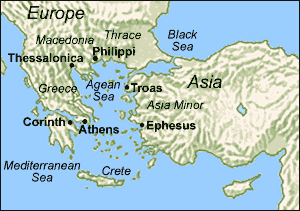Philippians 3 and the Rapture
Ron J. Bigalke Jr.

According to Acts 16:11-40, the Apostle Paul visited Philippi on his second missionary journey. He traveled from the island of Samothrace to Neapolis (modern Kavalla), which was the seaport utilized by the Philippian residents. The city of Philippi was approximately nine miles northwest of the seaport. The city was named in honor of King Philip II of Macedonia (the father of Alexander the Great). Philippi became a Roman military colony in 42 BC, following the defeat of Brutus and Cassius in battle by the triumvirs (Antony, Lepidus, and Octavian). The citizens benefited from an autonomous government, immunity from taxation, and conduct as if living in Italy.1 The first convert of the missionaries in Philippi was “a woman named Lydia,” whose heart was opened graciously and sovereignly by the Lord “to respond to the things spoken by Paul” (Acts 16:14). The church at Philippi was founded through the faithful ministry of Luke, Paul, Silas, and Timothy (16:1, 10, 12, 19; 20:6).

The Epistle to the Philippians was written during Paul’s first Roman imprisonment. Epaphroditus was sent from the church at Philippi to bring a monetary gift to the Apostle, which occasioned the writing of Philippians as an expanded letter of thanks (Phil 4:10-20; cf. 1:3, 5; 2:25, 30).3 Epaphroditus became “sick to the point of death” in Rome, which was cause for the Philippians’ expression of concern. Consequently, the Apostle informed the church with regard to Epaphroditus’ return to Philippi (2:25-28). Paul also reported the status of his trial before the Roman imperial court (1:7, 13-17), and even attempted to reconcile a church conflict (4:2). The theme of Philippians is “joy,” which is used 13 times. Christ is also mentioned 38 times, and therefore, “rejoicing in the Lord” is a prominent emphasis. The epistle contains significant revelation concerning Christ’s kenosis (2:7), which means His self-emptying of the prerogatives and powers that were His eternally by virtue of His divine attributes. The passage concerning His humiliation explains that by not asserting His divine prerogatives and powers,the Lord Jesus took the form of a servant (while never emptying Himself of His divinity) to become true humanity (2:5- 11). The epistle may be outlined quite basically as follows:
* Rejoicing in prison (1:1-30);
* Rejoicing in others (2:1-30);
* Rejoicing in the future (3:1- 21); and,
* Rejoicing in all things (4:1- 23).
The focus of this article will be upon section three (“rejoicing in the future”), especially Philippians 3:20-21.
The Context of Philippians 3:20-21
Philippians 3:15-21 focuses upon an attitude of life that is pleasing to God. Paul urged his readers to know the truth of what had been written previously. Moreover, he promised that those who were not living as they ought (i.e. “forgetting what lies behind and reaching forward to what lies ahead,” 3:13) would have this “different attitude” revealed to them by God. Christians should always live consistently with an understanding of the truth and not postpone a life of maturity. The immature, for instance, were not living maturely; rather, as the result of incomplete understanding of what God has revealed, they were postponing maturity as opposed to living in accord with the truth that they did understand. Therefore,the Apostle urged his readers to pursue maturity in Christ (3:15-16). 4 The life that pleases God must always focus attention upon the Person and work of Jesus Christ, as the believer is transformed into His likeness.
Paul concluded his admonition by exhorting believers to watchfulness (3:17-19) and hopefulness (3:20-21). For a second time (cf. 3:15), Paul exhorted his readers to follow his example. Not only was it necessary to pursue maturity in Christ, but it was also crucial to be watchful because many live “as enemies of the cross of Christ,” whose “end is destruction” (3:18-19). These false teachers are described threefold:
1. Their “god is their appetite” (i.e. fleshly and sensual);
2. Their “glory is in their shame” (i.e. disgraceful living); and,
3. They “set their minds on earthly things” (i.e. the material and physical as opposed to the eternal and spiritual) (3:19).
Therefore, the believer is to be watchful (observant) of those who live according to the standard of Christlikeness and to imitate such behavior, in contrast to those whose lifestyle indicated them as enemies of God (cf. Gal 4:3, 9-11; Col 2:21-22).
The reason to pursue maturity in Christ and to be watchful is related to the hope of the believer (Phil 3:20-21). Christians do have citizenship on earth, but also have citizenship in heaven (3:20). Maturity in Christ is the goal of the Christian life because heavenly citizenship is eternal, as opposed to the earthly life that is but a vapor (Jas 4:14; cf. Gal 4:26; Heb 11:10). Paul’s exhortation is an obvious contrast to those whose minds are focused upon “earthly things” and whose destiny is destruction. One challenge of the Christian life is learning to live as “strangers and exiles on the earth” (Heb 11:13; cf. 1 Pet 2:11).5 Consequently, the believer is to “eagerly wait for a Savior, the Lord Jesus Christ” (Phil 3:20).
The Coming of the Savior in Philippians 3:20-21
Philippians 3:20 first asserts that the believer’s “citizenship is in heaven.” Regarding the meaning of the Greek (to politeuma), The Expositor’s Greek Testament is noteworthy.
“This world has a characteristic spirit of its own. Worldliness is the common bond of citizenship in it. There is another commonwealth,6 not of the world (John xviii. 36), which inspires its members with a different tone of life. They ‘seek the things above where Christ sitteth at the right hand of God.’ . . . The stability and security of the pax Romana (one of the most favorable influences for Christianity) filled the thought of the time with high conceptions of citizenship and its value. This would specially appeal to thePhilippians,” who would have greatly esteemed the right to possess all the privileges of Italian citizens (i.e. jus Italicum) 7 (Acts 16:12, 21).
The believer eagerly waits for the Savior’s return from (ex ou) heaven. The believer’s citizenship is in heaven; (continue reading…)















